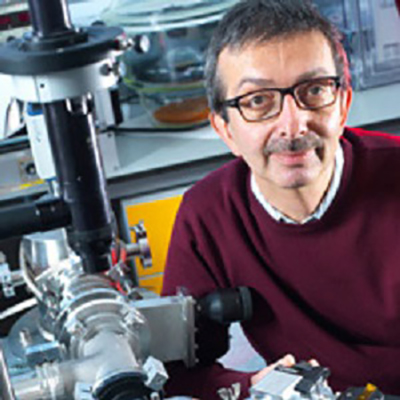
Alexander Tzalenchuk
NPL Fellow, NPL; Devices Focus Area Team Member, NPL Institutional PI, SQMS
Alexander Tzalenchuk is an NPL Fellow in Solid State Quantum Technologies. Alexander has over 35 years’ experience in solid-state physics, nanotechnology and quantum metrology.
He received a degree in Electronics Engineering from the National University of Science and Technology MISiS in Moscow and a PhD in Physics and Mathematics from the A V Shubnikov Institute of Crystallography, Russian Academy of Sciences.
In his early days in Moscow he studied charge transport in semiconducting and fast ion conductor bicrystals. Later he spent over 10 years at Chalmers University of Technology in Gothenburg, Sweden, investigating Josephson devices in high-Tc superconductors (HTS). In particular, he worked on the development of submicron technology for the HTS materials and studied a range of mesoscopic effects in ultrasmall HTS Josephson junctions.
Alexander joined NPL in February 2002. In 2016 he was appointed as an NPL Fellow and currently serves as the Deputy Chair of the NPL Senior Science College. In his role as the Head of Science Alexander oversees science planning and delivery in the Quantum Technologies Department, presently comprising about 100 FTE researchers. He plays a leading role in the NPL quantum programme to support UK economic growth and heads industrialisation activities in the EU Graphene Flagship. He is a founding member of the Technical Committee “Quantum Measurement and Quantum Information” in the International Measurement Confederation (IMEKO). Alongside his position at NPL he was appointed as a Visiting Professor at the University of London’s Royal Holloway College in 2008 and has been a Professor of Physics since 2013. He teaches a course “Frontiers of metrology”.
Areas of interest
Over the years Alexander was involved in several projects concerning quantum metrology, magnetic and superconducting macroscopic quantum systems, single particle detection, terahertz photon counting, scanning probe microscopy. His current focus is on:
- Assuring trust and confidence in graphene and 2D material-enabled products by designing and deploying reliable methods for evaluation of their properties and performance;
- Enabling realisation and dissemination of SI by developing robust, convenient quantum electrical standards based on 2D materials and unconventional superconductors;
- Underpinning scalability of superconducting quantum devices by understanding and eventually eliminating intrinsic sources of noise and decoherence;
- Improving energy efficiency of nanoelectronics by exploring and optimising heat dissipation pathways;
- Nurturing a quantum-aware generation by providing education, training, and career opportunities.
